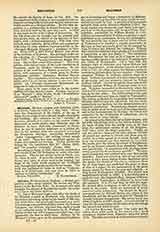

Malherbe, FRANCOIS, French poet, b. at Caen, Normandy, in 1555; d. at Paris, October 16, 1628. He was the eldest son of Francois Malherbe, councillor of the inferior court of judicature at Caen, and of Louise de Valois. It was the elder Malherbe’s wish that Francois should follow his profession and succeed him in his office, and with this end in view, he sent his son, after his early studies at Caen and Paris, to complete his education at the Universities of Basle and Heidelberg. But the natural bent of his mind was not towards the law, and when he was barely twenty Francois entered the service of Henri d’Angouleme, grand prieur of France and Governor of Provence. Malherbe’s earliest experience in Provence was his infatuation for a young woman of the country, whose praises he sang under the name of Neree; but on I October, 1581, he married Madeleine de Coriolis, and the union seems to have been a happy one. He remained ten years in Provence, becoming known through his “Larmes de St. Pierre”, an imitation of Tansillo’s verses and at best a puerile production. In 1586 Henri d’Angouleme was slain in a duel by Philip Altoviti, and Malherbe returned to Caen. He addressed an ode to Henry IV on the capture of Marseilles in 1596, and in 1600 presented to Maria de’ Medici, who stopped at Aachen on her way to become the queen of Henry IV, verses which show his talent to have reached its maturity.
Du Perron about this time recommended Malherbe to the favor of the king, and when in 1605 he came to Paris, Henry had him remain near him. The Duke of Bellegarde received the poet into his household, settled on him a pension, and made it possible for him to live at Court. At this time began his acquaintance with Racan, who became his first disciple, and a little later he started his correspondence with Peiresc. Since his arrival at Court Malherbe had assumed the role of literary master and reformer. He made relentless war on the provincial expressions, neologisms, and defects of style in the prose writers and poets of the time. He gathered about him a select body of followers, to whom his opinions were oracular, and he was pitiless in his criticism of whatever fell below his canons of taste. He himself henceforth wrote few verses, his most touching lines being on the tragic death of the king in 1610. His son’s death in a duel in 1627 did much to bring about Malherbe’s own end, which came in the following year, and he as buried in Saint-Germain-l’Auxerrois. Malherbe has been charged with having “slain lyricism” and the reproach has been made against him that his crusade produced only Maynard, but the French language and its literature are indebted to him for a service which could hardly have been rendered by a man of greater genius.
BLANCHE M. KELLY

